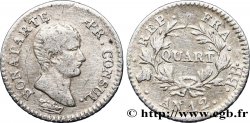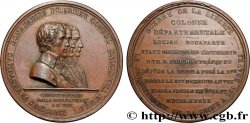v44_0739 - Essai au module de 5 francs par Auguste 1803 Paris VG.1221
MONNAIES 44 (2010)
Начальная цена : 2 800.00 €
Назначить цену : 6 000.00 €
Цена реализации : 7 400.00 €
Количество ставок : 11
Максимальная предлагаемая цена : 8 272.00 €
Начальная цена : 2 800.00 €
Назначить цену : 6 000.00 €
Цена реализации : 7 400.00 €
Количество ставок : 11
Максимальная предлагаемая цена : 8 272.00 €
Тип Essai au module de 5 francs par Auguste
Дата: An XI (1802-1803)
Монетный двор / Город: Paris
Количество отчеканенных монет: ---
Металл: silver
Проба: 900 ‰
Диаметр: 37,56 mm
Ориентация осей монеты: 6 h.
Вес: 24,99 g.
Век: en relief : DIEU/ JUSTICE/ ET FORCE.
Редкость: R3
Комментарии о состоянии
De petites marques de manipulation dans les champs et de fines hairlines dans les champs. De très belle frappe avec un très bon centrage et une sublime patine de médaillier. Exemplaire de toute beauté !
Ссылки в каталоге: :
Лицевая сторона
Аверс: легенда: NN. BONAPARTE - PREMR. CONSUL.
Аверс: описание: Tête nue de Bonaparte à droite ; signé H. AUGUSTE au-dessous.
Обратная сторона
Реверс: легенда: .REPUBLIQUE - FRANÇAISE. // 5 FRANCS. AN XI.
Реверс: Описание: Victoire ailée sur un globe tenant une palme de la main gauche, une couronne de la main droite et surmontée d’une étoile.
Комментарий
Inscription de la tranche en haut relief notamment au début de la première virole portant le mot DIEU ce qui provoque une excroissance importante au revers comme sur l’exemplaire photographié dans le Gadoury 1989. Cet essai a réalisé 4 400 francs lors de la vente de la Collection du prince d’Essling en 1928.
Inscription on the edge in high relief, notably at the beginning of the first ferrule bearing the word GOD, which causes a significant outgrowth on the reverse, as on the example photographed in Gadoury 1989. This sample achieved 4,400 francs at the sale of the Prince of Essling Collection in 1928.
Inscription on the edge in high relief, notably at the beginning of the first ferrule bearing the word GOD, which causes a significant outgrowth on the reverse, as on the example photographed in Gadoury 1989. This sample achieved 4,400 francs at the sale of the Prince of Essling Collection in 1928.








 Cообщить об ошибке
Cообщить об ошибке Распечатать страницу
Распечатать страницу Отправить мой выбор
Отправить мой выбор Задать вопрос
Задать вопрос Consign / sell
Consign / sell
 Информация
Информация









